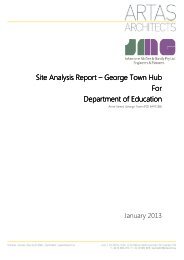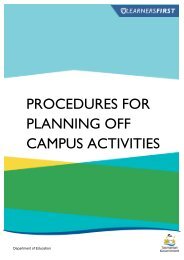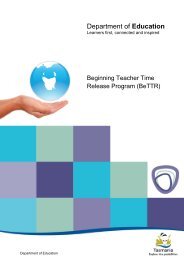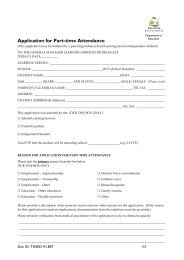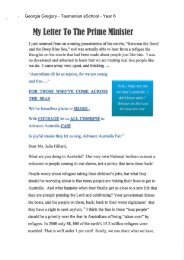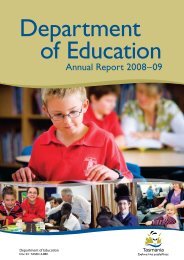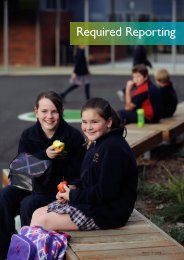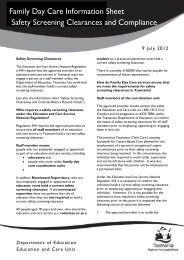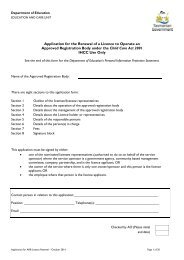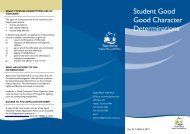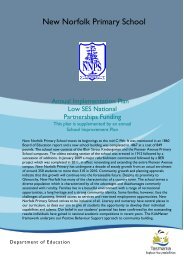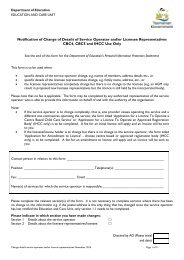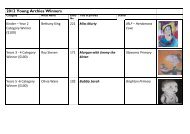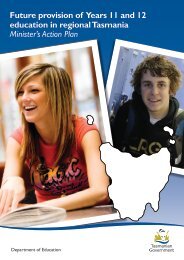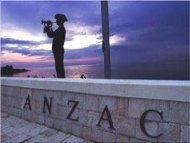Education
DoE Annual Report 2012-2013 - Department of Education
DoE Annual Report 2012-2013 - Department of Education
- No tags were found...
You also want an ePaper? Increase the reach of your titles
YUMPU automatically turns print PDFs into web optimized ePapers that Google loves.
School<br />
improvement<br />
planning –<br />
incorporating<br />
literacy and<br />
numeracy<br />
plans<br />
The department is supporting improvement in schools<br />
through the closer alignment of assessment data with<br />
targeted curriculum planning. Schools have been provided<br />
with comprehensive data on the performance of their<br />
students in the 2012 NAPLAN. During 2013, teachers<br />
were further supported in this with access to an improved<br />
online resource—the NAPLAN Toolkit.<br />
In addition, Curriculum Services and <strong>Education</strong>al<br />
Performance Services are providing further school-level<br />
support, including help desk assistance to aid their data<br />
analysis and planning.<br />
Principals and teachers are translating their findings into<br />
revised literacy and numeracy plans (as part of school<br />
improvement plans) at the school level, and implementing<br />
teaching and learning strategies to address the identified<br />
areas of future action. The plans are consistent with the<br />
expectations set in the department’s School Support and<br />
Expectations document. Under the literacy and numeracy<br />
section, areas for schools to focus on are:<br />
• development of whole-school approaches to literacy<br />
and numeracy<br />
• actively engaging with departmental support<br />
• use of data to support good teaching practice.<br />
Lead teachers and lead schools, in partnership with<br />
principal network leaders support schools in aligning<br />
their identified areas of future action with professional<br />
learning support. The Professional Learning Institute<br />
has been funded to support professional learning as a<br />
response to identified statewide needs, utilising data at<br />
the statewide level.<br />
Professional<br />
learning to<br />
support<br />
literacy and<br />
numeracy<br />
The Professional Learning Institute and Curriculum<br />
Services have identified, developed and delivered a range<br />
of professional learning opportunities over the course of<br />
2012–13 to ensure that school leaders have the requisite<br />
knowledge and skills as instructional leaders. Professional<br />
learning programs, with a focus on literacy and numeracy<br />
achievement, are:<br />
• Principals as Literacy Leaders<br />
• Secondary Principals as Literacy Leaders<br />
• Literacy for Learning<br />
• Numeracy Initiative Inquiry.<br />
These key professional learning opportunities for school<br />
leaders are further supported by network based literacy<br />
and numeracy inquiries that are coordinated by network<br />
lead teachers.<br />
Data informed teaching practice and school leadership<br />
have been further supported though the ‘Working with<br />
Data’ professional learning program. Using data to inform<br />
strategic school improvement planning and understanding<br />
how data translates into effective pedagogy were two of<br />
the key objectives for participants.<br />
Transition to<br />
the Australian<br />
Curriculum<br />
During 2013, Australian Curriculum English, Mathematics,<br />
Science and History are being taught, assessed and<br />
reported against in all schools from Prep to Year 10.<br />
Geography will be implemented from Prep to Year 8<br />
in 2014 and other subjects progressively from 2015.<br />
Literacy and numeracy are General Capabilities under the<br />
Australian Curriculum and are expected to be taught across<br />
all subjects and learning areas.<br />
<strong>Education</strong> Ministers agreed to use Australian Curriculum,<br />
Assessment and Reporting Authority (ACARA) content<br />
statements for senior secondary English, Mathematics,<br />
Science and History (14 subjects in total) ‘as the common<br />
base for developing local courses’ in December 2012.<br />
Eight curriculum teacher leaders with specific learning<br />
area responsibility across Years 9–12 have been<br />
appointed to provide direct school-based support for<br />
the Australian Curriculum.<br />
Other<br />
literacy and<br />
numeracy<br />
initiatives<br />
The following funded literacy and numeracy initiatives<br />
occurred in 2012–13:<br />
• Literacy Grants ($2.39 million) – literacy intervention<br />
support was provided to schools with the highest<br />
<strong>Education</strong>al Needs Index (ENI). General Literacy<br />
Grants ($4 million total) were allocated across<br />
all schools.<br />
• Reading Recovery ($340,550) – a school-based literacy<br />
intervention for Year 1 was a funded improvement<br />
strategy with 30 schools participating in 2012.<br />
• Flying Start ($10.99 million) – a staffing allocation made<br />
to primary and combined schools to support literacy<br />
teaching and learning from Kindergarten to Year 2.<br />
All primary and combined schools provided this early<br />
intervention in literacy.<br />
• Premier’s Reading Challenge – is a 10 week program<br />
offering all Tasmanian students and schools a range<br />
of incentives to read more often and more widely.<br />
Students from Prep to Year 6 are challenged to read<br />
at least one book in each week of the program.<br />
The Challenge aims to improve the reading and<br />
literacy skills of students, raise parent and community<br />
awareness about the importance of reading with<br />
children and give young students a pathway to a<br />
lifelong love of books and reading. In 2012, 11,623<br />
primary school students and 156 schools completed<br />
the Premier’s Reading Challenge, with more than<br />
116,000 books read and over 1,800 book reviews<br />
submitted.<br />
• Partnerships in Teaching Excellence (PiTE) – this<br />
pre-service training program is in part used to better<br />
prepare beginning teachers as literacy and numeracy<br />
teachers. Twenty-two university students were part<br />
of this initiative in 2012 and 20 of those students are<br />
now employed in government schools. There are<br />
16 students in the program in 2013.<br />
Pre-Compulsory and Compulsory <strong>Education</strong> » Literacy and Numeracy<br />
33



